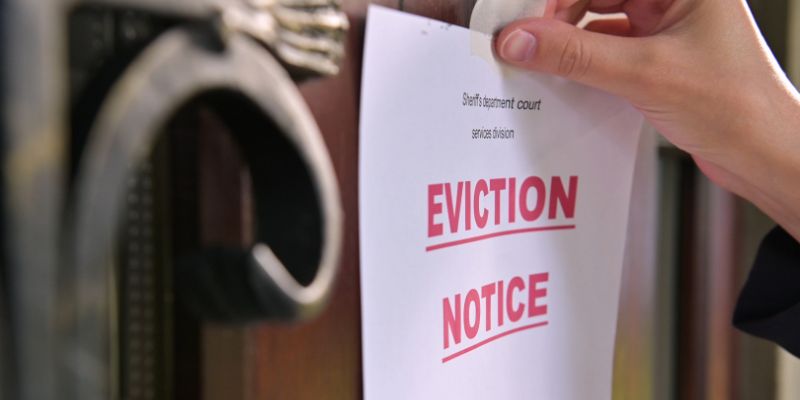If you are considering filing for bankruptcy, you must be in a difficult financial place. Having debts that have built up over time might have put a significant strain on you, especially if you lost a source of income, perhaps your only source. Being unable to pay back a debt such as rent might have led to you being evicted from your home or being threatened with eviction. You might be wondering, “Does bankruptcy clear evictions in Texas?”
An eviction may be seen on your record by all potential landlords and can make it harder for you to find a new place to rent. You may consider bankruptcy to clear your debts and maybe even have the eviction removed from your record. It is highly recommended that you speak with a Texas bankruptcy attorney before making such a big decision.

There are several ways filing for bankruptcy can be a significant benefit to you. It can allow you to discharge debts or enter a repayment plan to eventually pay them all back. This includes any rent you owe to a former landlord after being evicted. Unfortunately, while filing for bankruptcy may assist with resolving back rent, it cannot clear an eviction from your record.
The landlord who evicted you has the right to report an eviction as well as any payment problems to the credit bureau. If a future landlord were to do a background check on you or check your credit, the eviction would likely appear on both. Even if the landlord does not report the eviction, an eviction case would be a public record that a credit bureau could pick up and report. The information would also stay on your credit report for up to seven years.
Filing for Chapter 7 bankruptcy is a useful way to give yourself some time to get your finances together so that you can catch up on rent to keep from being evicted. A Chapter 7 case can last three to five months, and during this time, a judge places an automatic stay on your assets.
No debt collectors, including landlords, are allowed to reach out to you regarding payments or garnish any of your wages or bank accounts. If you have already been evicted, Chapter 7 may allow any owed rent to be discharged.
Chapter 13 bankruptcy may be a better option when facing eviction, especially if you do not qualify for Chapter 7, depending on your financial standing. Chapter 13 allows you to come to an agreement with your landlord about how you will pay back the rent you owe over time while also paying ongoing rent. This process can last three to five years. Of course, for a repayment agreement such as this, you will need to have a consistent source of income to avoid getting behind again.
Filing for Chapter 7 or Chapter 13 bankruptcy can help you hold off an eviction, provided your landlord allows it. If your landlord is planning to evict you, filing for bankruptcy can put a temporary stop to the eviction process for as long as the case is open. However, your landlord can file a motion with the court to request for the automatic stay to be lifted. Oftentimes, a judge will grant the landlord’s request. In this case, the eviction process will continue.
Filing for bankruptcy also will not prevent an eviction if your landlord has completed the eviction process and has already given a judgment to evict you. An automatic stay cannot stop the eviction at this point. With the threat of eviction, it may be necessary to prepare to move and consult with an attorney about your options in case things do not go the way you expect.
A: Filing for bankruptcy is very unlikely to stop an eviction in Texas permanently. Filing Chapter 7 or Chapter 13 will only place a temporary stop to the eviction during the automatic stay period, but this is only if the landlord has not given you an eviction judgment yet. The stay can give you some time to recover your finances to be able to possibly pay the rent you owe. However, your landlord can still have the automatic stay lifted.
A: Bankruptcy does not clear all debt in Texas. Certain debts, including but not limited to child support, spousal support, most taxes, and most student loans, are not able to be discharged at all. While an automatic stay may stop garnishment for these debts, you will have to pay them when the stay ends.
A: Compared to other states, Texas law protects many assets from bankruptcy. These include:
A. In addition to other property and assets, Texas also allows you to protect unemployment funds, workers’ compensation, alimony, and your current wages that are not court-ordered support from bankruptcy. These funds can remain in your possession, and you are not to include them in the total value of your personal property.
Having to determine how to pay back an excessive amount of rent that you owe is stressful. If you’d like to know more about how filing for bankruptcy may affect you, contact Steele Law Firm, PLLC, and schedule a consultation today. We can answer all your questions and perhaps determine which course of action would benefit you most.




